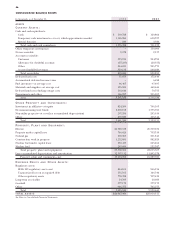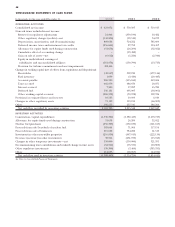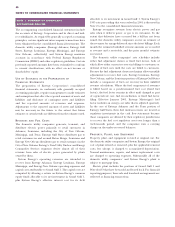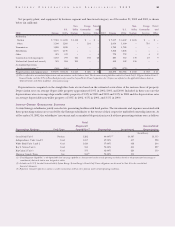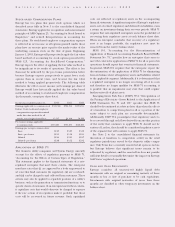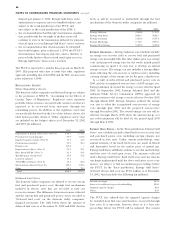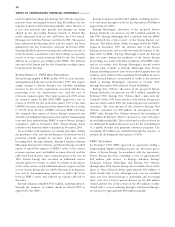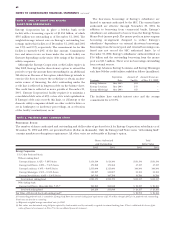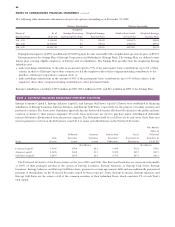Entergy 2002 Annual Report Download - page 57
Download and view the complete annual report
Please find page 57 of the 2002 Entergy annual report below. You can navigate through the pages in the report by either clicking on the pages listed below, or by using the keyword search tool below to find specific information within the annual report.
TRANSITION TO COMPETITION LIABILITIES
In conjunction with electric utility industry restructuring
activity in Texas, regulatory mechanisms were established to
mitigate potential stranded costs. Texas restructuring legislation
allows depreciation on transmission and distribution assets
to be directed toward generation assets. The liability recorded
as a result of this mechanism is classified as “transition to
competition” deferred credits.
REACQUIRED DEBT
The premiums and costs associated with reacquired debt of the
domestic utility companies and System Energy (except that
portion allocable to the deregulated operations of Entergy Gulf
States) are being amortized over the life of the related new
issuances, in accordance with ratemaking treatment.
FOREIGN CURRENCY TRANSLATION
All assets and liabilities of Entergy’s foreign subsidiaries are
translated into U.S. dollars at the exchange rate in effect at the
end of the period. Revenues and expenses are translated at
average exchange rates prevailing during the period. The
resulting translation adjustments are reflected in a separate
component of shareholders’ equity. Current exchange rates
are used for U.S. dollar disclosures of future obligations
denominated in foreign currencies.
NEW ACCOUNTING PRONOUNCEMENT
SFAS 143, which was implemented in the first quarter of 2003,
requires the recording of liabilities for all legal obligations asso-
ciated with the retirement of long-lived assets that result from
the normal operation of those assets. These liabilities will be
recorded at their fair values (which are likely to be the present
values of the estimated future cash outflows) in the period in
which they are incurred, with an accompanying addition to
the recorded cost of the long-lived asset. The asset retirement
obligation will be accreted each year through a charge to
expense, to reflect the time value of money for this present
value obligation. The amounts added to the carrying amounts
of the long-lived assets will be depreciated over the useful lives
of the assets. The net effect of implementing this standard for
Entergy’s regulated utilities will be recorded as a regulatory
asset or liability, with no resulting impact on Entergy’s net
income. The implementation of SFAS 143 for the portion of
River Bend not subject to cost-based ratemaking is expected
to decrease earnings by approximately $25 million as a result of
a one-time cumulative effect of accounting change. For the
Non-Utility Nuclear business, the implementation of SFAS 143
is expected to result in a decrease in liabilities of approximately
$520 million as a result of the discounting methodology
required by SFAS 143. Assets are expected to decrease in 2003
by approximately $360 million, and earnings are expected to
increase by approximately $160 million as a result of a one-time
cumulative effect of accounting change.
NOTE 2. RATE AND REGULATORY MATTERS
ELECTRIC INDUSTRY RESTRUCTURING AND THE
CONTINUED APPLICATION OF SFAS 71
Although Arkansas and Texas enacted retail open access laws,
the retail open access law in Arkansas has now been repealed.
Retail open access in Entergy Gulf States’ service territory
in Texas has been delayed. Entergy believes that significant
issues remain to be addressed by regulators, and the enacted
law in Texas does not provide sufficient detail to allow
Entergy Gulf States to reasonably determine the impact on
Entergy Gulf States’ regulated operations. Entergy therefore
continues to apply regulatory accounting principles to the
retail operations of all of the domestic utility companies.
Following is a summary of the status of retail open access in
the domestic utility companies’ retail service territories.
% of Entergy’s
2002 Revenues Derived
from Retail Electric Utility
Status of Retail Operations in
Jurisdiction Open Access the Jurisdiction
Arkansas Retail open access legislation
was repealed in February 2003. 14.5%
Texas Implementation was delayed in Entergy
Gulf States’ service area in a settlement
approved by the Public Utility Commission
of Texas (PUCT). Retail open access is not
likely before the first quarter of 2004.
Status is discussed further below. 10.4%
Louisiana The LPSC has deferred pursuing retail
open access, pending developments at
the federal level and in other states. 33.5%
Mississippi The Mississippi Public Service Corporation
(MPSC) has recommended not pursuing
open access at this time. 10.6%
New Orleans The Council of the City of New Orleans,
Louisiana (Council or City Council) has
taken no action on Entergy New Orleans’
proposal filed in 1997. 5.0%
Retail open access commenced in portions of Texas on
January 1, 2002. The staff of the PUCT filed a petition to delay
retail open access in Entergy Gulf States’ service area, and
Entergy Gulf States reached a settlement agreement with the
PUCT to delay retail open access until at least September 15,
2002. In September 2002, the PUCT ordered Entergy Gulf
States to file on January 24, 2003 a proposal for an interim
solution – retail open access without a FERC-approved
regional transmission organization (RTO) – if it appears by
January 15, 2003 that a FERC-approved RTO will not be func-
tional by January 1, 2004. On January 24, 2003, Entergy Gulf
States filed its proposal, which among other elements,
includes:
the recommendation that retail open access in Entergy
Gulf States’ Texas service territory, including corporate
unbundling, occur by January 1, 2004, or else be delayed
until at least January 1, 2007 (If retail open access is
ENTERGY CORPORATION AND SUBSIDIARIES 2002 55



